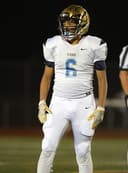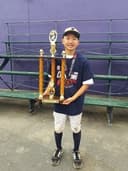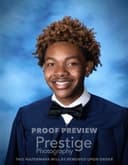Oakley Briskman '25 Recruiting Profile

Video
 Oakley Briskman 5...
Oakley Briskman 5... Oakley Briskman 2...
Oakley Briskman 2... Oakley Briskman P...
Oakley Briskman P... Oakley Briskman 2...
Oakley Briskman 2...Personal Statement
My name is Oakley Briskman, Class of ‘25 at Latitude 37.8 Charter High School in Oakland, CA. To make my profile visible, I selected Lighthouse Charter High School in Oakland as Latitude is not on NCSA’s list. Making different choices, though, is something I’ve done throughout my athletic and academic careers, and these choices illustrate why I believe I will be an asset to my college swim team.
Latitude is only seven years old and won an X Prize at launch for its innovative model that integrates the city of Oakland into students’ learning experiences. Integrating Oakland into the school is important because it contributed to my decision to found and captain Latitude’s swim team last year.
Increasing equity in the water drove my decision to found the team. I began swimming competitively at age seven for the Montclair Swim Team. Montclair is a privileged team, and I swam there until I was 13, when all swimmers age off. Montclair tends to feed clubs like Piedmont and Orinda, and all of my teammates chose those teams. I knew, however, those paths were not for me, even if that meant sacrificing my own progress in the pool by making a choice that felt truer to who I aspire to be. Although I learned excellent technique on Montclair, I also learned what discrimination and unexamined implicit bias look like on deck and in the water, and I wanted to be part of a swimming community intentionally seeking to serve a more-representative-of-Oakland community.
My values led me to Oaklantis, an Oakland start-up club that frequently canceled practices at the last minute due to the lack of access to a lifeguard or a pool with safe chlorine levels. Oaklantis’ founders created the club not only to offer a high quality local option to elite Oakland swimmers of color who often left the city to swim for other clubs, but also to create a large-scale feeder program that offered affordable swim lessons to very young children who could eventually age on to the swim team. Oaklantis was exactly what I was looking for when I left Montclair, and, like all things, it came with trade offs. I did very little swimming when I was 14, in part due to COVID-19, but also in part due to the fact that Oaklantis faced obstacles more privileged teams never had to contemplate. These experiences also explain why I have gladly served as Oaklantis’, and now the Alameda Gators’, USA Swimming DEI Representative for over three years.
Against that backdrop, I realized the potential athletic equity opportunity Latitude presented. Latitude is 67% Hispanic or Latino, 15% African American, 5% two or more races, 4% Asian, and 6% White. As a privileged white female, I am very much in the minority. As passionate as I am about swimming, I didn’t want to assume others at my school would necessarily have the same interest (after all, no one else in the past seven years tried to start the swim team). I didn’t want to start a team that could siphon scarce resources away from other opportunities perhaps more aligned to student body interest. I did, though, want to at least explore increasing access to swimming for my Oakland high school’s diverse population.
I created and distributed an interest survey to my fellow Latitude students, and received 48 responses. Students' answers surfaced several concerns unique to swimming (as opposed to, for example, what the founders of the basketball team faced). Students reported hesitations about joining the swim team, including: 1) difficulty overcoming past traumatic experiences; 2) being socially conditioned to doubt one's swimming ability; and 3) experiencing discomfort or anxiety related to swimming attire. I did my best to address these concerns while recruiting, and managed to sign up seven swimmers, six of whom were swimmers of color.
I convinced my Oaklantis coach to grant the Latitude team one lane at our pool, and I co-led our weekly practice along with our founding coach. Yes, one practice per week was where we needed to start given the many other competing priorities my teammates had. Some students chose to practice with us as part of learning to swim, but opted to never compete. Three of the students both practiced and competed. Unfortunately, due to an ill-timed Oakland teachers’ strike in May of 2023, our League qualifying meet for the State championship was canceled and Latitude’s season ended prematurely. We were small and humble, but Latitude had a swim team and Oakland had a few more black and brown bodies in the water.
I am currently working on bringing the swim team back for a second year, though I am still facing some of the same first-year challenges. For example, last year’s coach left Latitude, and so in addition to looking for another coach, I am also preparing to serve as the coach myself, with an adult sponsor in place for supervisory support only. Despite this challenge, I have bigger dreams for this year and the years to come. I have partnered with the Latitude Athletic Director, former Golden State Warrior Al Attles, who is assisting me with: 1) getting as many kids in the water as possible by partnering with Oakland Parks and Recreation so that Latitude students can become lifeguards as a way to create income for themselves and their families; 2) designing a curriculum to teach and spread awareness about the history of Black and Brown communities in swimming pools; and 3) building a stable financial position by raising $50,000 - $100,000 to fund swim lessons and gear for the Latitude swim team.
These are ambitious goals, but I want to make sure that I establish the swim team firmly enough so that it will continue to exist once I leave Latitude.
My founding story illustrates who I am as a person in and out of the water. I see possibilities. I am undaunted by complex challenges and long odds. I simply do not quit. I am particularly sensitive, as a prospective college athlete, to the importance of keeping my word as I know how big a problem it can be for coaches to see athletes they’ve recruited quit a program only one or two years into their college career. I think I can also genuinely say I have experienced a tiny sense of this frustration myself while recruiting for the Latitude team, as I’ve certainly lost some students who’d told me they were going to join the team.
I've made some distinct and different choices in my academic career, as well. At the start of the pandemic, I skipped 8th grade, starting my high school clock one year early. Currently, though, I am in the middle of a gap year between my Junior and Senior years at Latitude, putting me back on track with my age cohort. I have maintained a 4.0 GPA (on a 4.0 scale) throughout my high school career, taken every honors class Latitude offers, and two fast-track, eight-week community college courses last year. Seeking to challenge myself even more in preparation for a Pre-Med course of study in college, this year I am enrolled full-time in community college classes, including Calculus, Chemistry, and Microbiology. In May I expect to earn my Certified Nurse’s Assistant certificate, which will allow me to return to a local internship I completed last year at a home and health center for unhoused Oakland residents. In addition, I am working with a mentor at the Stanford School of Medicine, leading up to working in my mentor’s lab over the coming summer.
My gap year also offers me more time in the pool to improve my times. I am not as fast, yet, as I know I can be. My times are modest. What I have demonstrated to myself, though, is that I am unafraid of the suffering often required to reach the next level. I am unafraid of making uncommon or unpopular choices in the name of staying true to myself. I am unafraid of making sacrifices for what I believe is right. I am unafraid of persisting, even when I am unsure if I’ll ever reach my goals.
I may not be the fastest swimmer on your team, but I may be the most steadfast. You can count on me to lead in and out of the water, to push myself and my teammates every day, and to reflect humbly on failure and feedback as part of my overall learning process. I understand not only what it means to be a teammate, but also what it means to create a team –to create opportunity– out of thin air.
I wonder what we might create together!
Athletics
High School Information
- Years w/ Varsity
- 1 year
- 2023 Varsity Team
Individual Awards
- Team Founder and Captain
Club Information
- Seasons of Club Experience
- 1 season
- 2023 Alameda Alligators (Senior Elite)
Coach References
- Club Coach
- Abdallah Magoub
Statistics
Academics
Grades
Test Scores
High School Information
Academic Accomplishments
Are you in honor classes?
Yes. Honors Biology, Honors Humanities Sophomore Year, Honors Humanities Junior Year, Honors Algebra II, Honors Pre-Calculus. I have taken every single Honors class available to me. Additionally, in order to increase the rigor of my course work, I have taken the following classes at community colleges and have received a grade of A in every one: Spanish I, Spanish II, Psychology, Calculus I, Introduction to Chemistry, Calculus II, Microbiology, English IA, Gerontology: Death and Dying. My high school does not offer AP or IB classes.Are you in AP/IB classes?
NoRegistered with the NCAA Eligibility Center?
NoAwards and Activities
- AwardsUniversity of California Eligibility in the Local Context - recognizes students who are in the top 9% of their class, 2023 Student-Athlete Award, Founders Award (for founding Latitude 37.8 Charter School's Swim Team)
- ActivitiesUkelele, Internship - Lawrence Hall of Science, Berkeley, CA, Community Service in Swimming, Research Mentorship focused on learning about reading, designing, and conducting research in the medical field, Internship at CARDEA Health, Student Newspaper, Project INVENT (design thinking competition), Model UN
Top NCSA Athletes at Lighthouse Community Charter High School




Top NCSA Athletes in Area




